“The oldest and strongest emotion of mankind is fear, and the oldest and strongest kind of fear is fear of the unknown” — H.P. Lovecraft
While on the surface, one would think that the “unknown” that Lovecraft is speaking of is akin to a shapeless manifestation of an elder god, I think that the “unknown” is of a more mundane nature. It’s not really faceless horrors that keep us from sleep; it’s the threat or losing your job, or your house, or your children. We’re afraid of disease, of being robbed, of getting in an accident; all of these fears are knowable things, but what makes us afraid is not knowing what will happen to us once we encounter our fears. Dan Gildark’s Cthulhu dresses up every day fears with cosmic horror as well. In this case, the fear is one many queer people have: returning to the small towns of their youth.
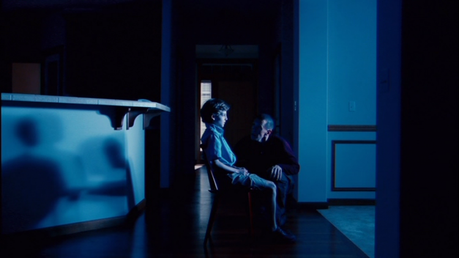
- Queer Fear #1: Nothing Good on TV
Russ Marsh (Jason Cottle) is a history professor living in Seattle, who must come back to his hometown of Rivermouth for his mother’s funeral. He wants to leave as soon as possible, but must stay until after the May festival ends and his father can auction of his mother’s estate. Russ passes the time by trying to reconnect with his old best friend/lover Mike (Scott Green), as well as fighting with his creepy New Age priest father, Reverend Marsh (Dennis Kleinsmith). When Russ wakes up from a nightmare to discover a bizarre cudgel, he begins to dig into the mystery of Rivermouth, and how many of its children are disappearing. Inevitably, this leads him to a mystery relating to his family, the town, and the end of the world.
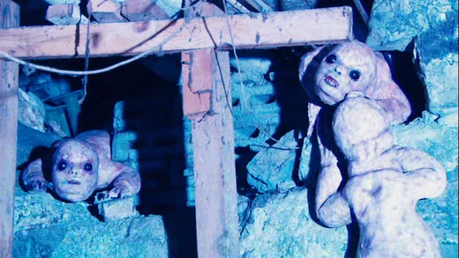
Queer Fear #2: Bad Special Effects
The fantasy of leaving a small town filled with smaller minds is a common one for gay youths, but attached to that dream is the fear that eventually they’ll have to return to a place that is less than welcoming. Behind that vague fear are smaller, more specific fears: fear of disappointed families, fear of rejection and persecution, and fear of being forced to live the life you tried to escape. The first fear– the fear of disappointed families– is one that is common, even for queer people who don’t come from small towns. Even if your parents are liberal, they’ll still probably wish you were straight, especially when it comes to having grandchildren. Unfortunately for Russ, his father is obsessed with progeny, and he won’t be appeased with adoption. Of course, Reverend Marsh’s obsession is more sinister than most other parent’s desire for grandchildren, but the sentiment is the same.
Perhaps more dismaying is the accusation from other family members that you’re selfish for leaving. This is what Russ’s sister, Dannie (Cara Buono), subtly accuses him of, seeing as she was the one who took care of their dying mother. When Russ tries to defend himself, saying he needed to leave, his sister replies: “We love you, but we don’t understand you.” This quote is the crux on which the fear of familial disappointment rests: it states that what you’ve always been afraid of was true, that you are an alien to your family; a plum growing in an apple tree.
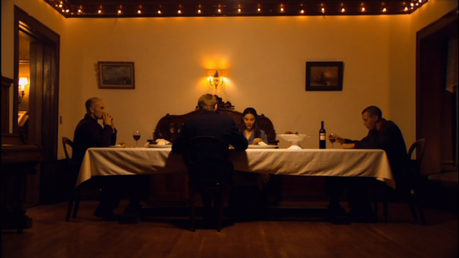
Queer Fear #3: Burnt Meatloaf
The second fear–fear of rejection and persecution– is similar to the first, only amplified to a larger social circle (the whole town) and upping the ante of hostility. The first person to reject Russ is his old friend Mike, who left him for a woman after high school. Mike flutters between rejection and acceptance of Russ throughout the film. While Russ is exploring a site that may have clues to the mystery, Mike abandons him; when Russ sees the not-quite-human creatures living beneath the city’s streets, Mike doesn’t believe him. Even when Mike finally admits to having feelings for Russ, and they have sex, Mike immediately disavows being a homosexual.
While Mike’s hesitance to accept his relationship with Russ is frustrating it does not match the hostility Russ receives from the townspeople. Throughout the film, it seems like Russ’s feelings of persecution are almost without merit, until near the climax when he is accused of the rape and murder of a young boy. While there is no definite proof that the accusation is simply because of Russ’s sexuality (most of the derision from the sheriff comes from hatred of the Meyers family), the accusation of rape when the boy was not raped seems proof enough. Whether or not the accusation is based in homophobia is really not important, as it adequately symbolizes the fear many queer people have of being the victims of the “gay equals pedophile” myth.
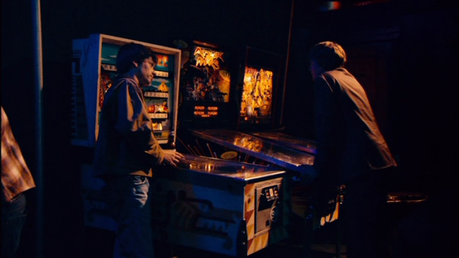
Queer Fear #4: Over use of the blue/orange color scheme
The final fear– the fear of being forced into the life you tried to escape– is a fear that is embodied in almost all of Lovecraft’s work. The family has a dark inheritance, and the climax of the film revolves around whether or not Russ will accept it. Despite the element of choice in the climax, one could argue that there is little choice in the matter. This is especially true on the subject of children. Throughout the film, Russ’s father tries to convince him to have children consensually, but eventually the choice is taken away from Russ by the townspeople. An old schoolmate of Russ’s, Susan, takes him back to her house, ostensibly to find a book that explains the bizarre cudgel, but instead drugs and rapes him. The result is the grandchildren that Reverend Marsh so desires, but the children are implied to be hideous elder god/human hybrids. Russ is being forced to become something that he doesn’t want, something that repulses him. Even worse, while he (and by extension, the audience) views this life as an abomination, the people around him view it as not only good, but necessary. Not only should he live the life they’ve made for him, but living this life will be the best for the community as a whole. They believe it is the “moral” lifestyle choice, and it is noble for Russ to abandon who he is. This point is hammered home by Reverend Marsh’s final words: “Make Sacrifice!”
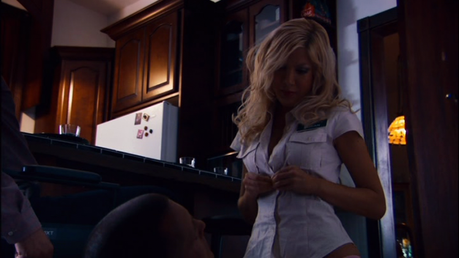
Queer Fear #5: The Ultimate Sacrifice
As far as supernatural chills go, Cthulhu will unfortunately disappoint. But the atmosphere of dread permeates the film; it starts with newscasts that give hints that the world is at the brink of destruction from war and environmental disasters, and the mood the film creates is certainly Lovecraftian. There will be those put-off by the gay themes of the movie, but then, that would tell us about what unknown they fear.
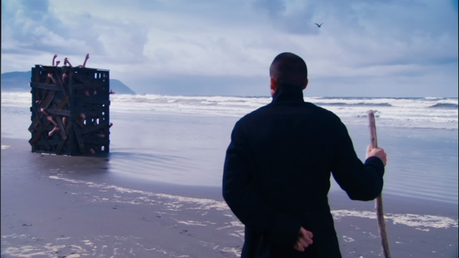
Queer Fear #6: Having to Gentrify the Neighborhood all by yourself.


